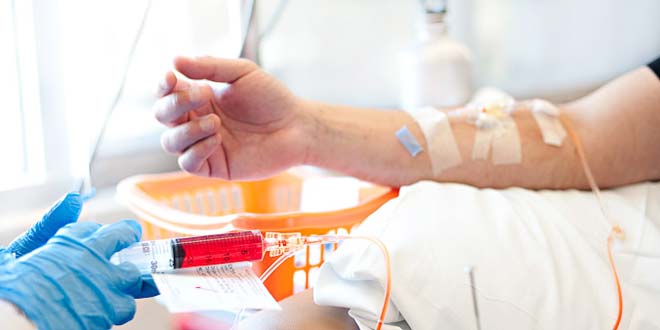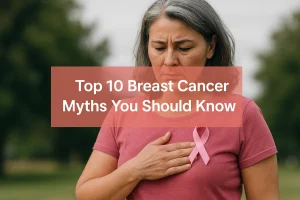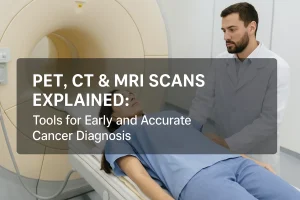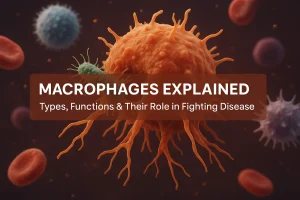
Chemotherapy vs Radiation Therapy: Key Differences in Cancer Treatment
Chemotherapy and radiation therapy are among the most common cancer treatments. These therapies can be used together, with other treatments, or on their own, depending on the patient’s needs. The treatment plan is always customized to the individual, taking a whole-health approach that considers the body, mind, and spirit.
Understanding how these treatments work—and how they differ—can help patients make informed decisions during their cancer journey.
What is Chemotherapy and how does it work?
Chemotherapy is a systemic treatment that uses drugs to kill fast-dividing cells throughout the body. This includes cancer cells but also impacts healthy cells that divide rapidly, leading to side effects.
How Chemotherapy Works
- Targets rapidly dividing cells, not just at the tumor site but throughout the body.
- Prevents the spread by destroying cancer cells.
- Often used before or after surgery or radiation.
Methods of Administration
- Intravenous (IV) infusions
- Oral medications
- Injections
- Topical applications
What are the Common Side Effects of Chemotherapy?
- Fatigue, hair loss, nausea
- Anaemia and increased infection risk
- Nerve damage (tingling, numbness)
- Chemo brain (memory and focus issues)
- Mood and fertility changes
What Is Radiation Therapy?
Radiation therapy is a localized treatment that uses high-energy rays to destroy the cancerous cells in a specific area.
How Does Radiation Work?
- Targets the tumor site with precision
- Damages cancer cell DNA, stopping growth and causing cell death
- Surrounding healthy tissue may recover after treatment
Radiation Therapy Side Effects: Early vs Late
Early Side Effects (during treatment):
- Fatigue
- Skin changes (redness, irritation)
- Site-specific effects (e.g., mouth sores in head and neck cancer)
Late Side Effects (months or years later):
- Long-term tissue damage
- Fertility issues if the pelvic area is treated
- Organ-specific risks (e.g., heart in breast cancer)
:max_bytes(150000):strip_icc():format(webp)/VWH-LauraPorter-ChemotherapyvsRadiation-Standard-caaac16b720b4c71ad7cab42b2600947.jpg)
Key Benefits of Chemotherapy and Radiation Therapy
| Aspect | Chemotherapy | Radiation Therapy |
| Scope | Whole-body (systemic) | Localized (targeted) |
| Ideal for | Cancer that has spread | Tumors in a specific area |
| Method | Drug-based | Energy beam or internal radiation |
| Side Effects | More generalized | More localized |
| Complementary Use | Yes, often combined | Yes, it can be used with chemo or surgery |
Can Chemotherapy and Radiation be used together?
In many cancer cases, combining chemotherapy and radiation often leads to improved treatment outcomes, especially in advanced or aggressive cancers.
Chemo and Radiation therapy can be used together in:-
- Neoadjuvant therapy: Treatment before surgery to shrink tumors.
- Adjuvant therapy: Given after initial treatment to prevent recurrence.
- Synergistic effect: Chemotherapy may make radiation more effective.
When are Chemotherapy and Radiation recommended?
The Choice depends on the cancer’s stage, type, and individual health; Often used in combination. Radiation helps shrink the tumor at a specific site, while chemotherapy uses powerful drugs to target any remaining cancerous cells throughout the body.
Here is the summarized table showing its use for cancer types
| Treatment | Use | Examples |
| Chemotherapy | Used for metastatic cancers, cancers with a high risk of spreading, or when surgery isn’t an option | – Breast cancer (as adjuvant therapy after surgery)
– Lymphoma – Some lung cancers – Some brain cancers |
| Radiation | Localized treatment that targets cancer cells in a specific area; used post-surgery or in combination with chemotherapy | – Breast cancer (after lumpectomy)
– Some lung cancers – Brain tumors |
Chemo vs Radiation: Which Is Tougher on the Body?
It depends on:
- Type and stage of cancer
- Dosage and treatment duration
- Individual health factors
Chemotherapy tends to affect the whole body, causing more generalized side effects. Radiation affects the treatment area but may cause long-term complications depending on the location.
What is Immunotherapy? A new advance in Cancer Treatment
Chemotherapy and radiation therapy are traditional cancer treatments that, while effective, are often imprecise and can produce side effects by affecting healthy cells in addition to cancer cells.
Immunotherapy is an advanced technique that enhances the immune system to fight cancer and is often seen as the future of cancer treatment. Types such as dendritic cell-based immunotherapy offer fewer side effects and longer-lasting results. It’s especially effective in cancers that don’t respond well to traditional therapies.
How Immunotherapy Works
- Boosts immune system activity to recognize and fight cancer.
- Help the immune system target specific proteins on cancer cells.
- Trains your body to develop long-term cancer-fighting memory.
When Is Immunotherapy Used?
- Often used in advanced or resistant cancers.
- Ideal for certain types like melanoma, lung cancer, bladder cancer, and head and neck cancers.
- It can be used in combination with chemo or radiation for better outcomes.
Tips to Manage Side Effects
Managing treatment side effects is crucial for your comfort and recovery. Here’s how you can effectively address them:
- Eat small, bland meals frequently to ease nausea and maintain energy.
- Drink plenty of fluids to stay hydrated and support your body.
- Gently cleanse radiation-treated skin and use only doctor-approved lotions.
- Get enough rest to help your body recover from fatigue.
- Seek emotional support from family, friends, or support groups.
- Take medications on time to manage symptoms like pain or nausea.
- If you have side effects like fever, rashes, or severe discomfort, to your doctor accordingly.
Questions to ask my Oncologist before Treatment
- What is the purpose of this treatment: cure, control, or symptom relief?
- Will I need both chemotherapy and radiation treatment?
- What are the possible short and long-term side effects?
- How will this treatment influence my fertility and sexual health?
- Are there any advanced possibilities, such as immunotherapy or targeted therapies?
- How will this affect my everyday life and work routines?
- Are there clinical trials for my cancer type?
- What can I do to manage side effects effectively?
Quick Overview: Chemo vs Radiation vs Immunotherapy
| Aspect | Chemotherapy | Radiation Therapy | Immunotherapy |
| Type | Drug-based (systemic) | energy beam, targeting cancer cells (Localized ) | Biologic therapy using the immune system |
| Use | Metastatic or high-risk cancers | Local tumors or post-surgery control | Advanced or immune-sensitive cancers |
| Effective on | Whole body | Specific site | Whole body (but immune-targeted) |
| Side Effects | Nausea, fatigue, hair loss | Skin irritation, local discomfort | Fatigue, autoimmune-like inflammation |
| Combination Use | With radiation or surgery | With chemo or surgery | With chemo, radiation, or targeted therapy |
A key thought
Every cancer is unique, and so is every treatment journey. Both chemotherapy and radiation therapy are vital tools in cancer care. While chemo works throughout the body, radiation offers precise, targeted destruction of cancer cells. Some patients may benefit from one, both, or additional treatments like immunotherapy, targeted therapy, and confident decisions with personalized care that offers the best chance of healing and hope.
Frequently Asked Questions
Can chemo and radiation be given together?
Yes. In some cases, they are combined to kill any remaining cancerous cells post-surgery and also increase treatment effectiveness.
Which is more painful—chemotherapy or radiation?
Both treatments have discomfort, but side effects vary. Radiation can cause site-specific pain, while chemo may cause nausea, fatigue, and immune suppression.
Will I lose hair with radiation therapy?
Only if the treated area involves hair follicles, like the scalp region.
Is fertility affected by cancer treatment?
Yes. if directed near reproductive organs, both treatments can impact fertility,
Which treatment is more effective?
It depends on the cancer type, location, and stage. Your oncologist will personalize your treatment plan.
Is immunotherapy better than chemo?
It can be—for cancers like lung, skin, or bladder. It boosts your immune system to fight cancer, and can be used along with chemo for better results.
What are the common side effects of immunotherapy?
Tiredness, skin rash, and mild fever are common. Rarely, it may cause organ inflammation, like in the lungs or liver.







